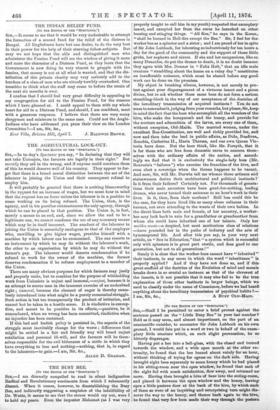THE BUSY BEE.
[TO THE EDITOR OF THE "SPECTATOR."]
am diurnally compelled to read in silent indignation Radical and Revolutionary sentiments from which I vehemently dissent. When it comes, however, to disestablishing the Busy Bee, and indirectly suggesting a suspicion of the infallibility of Dr. Watts, it seems to me that the stones would cry out, were I to hold my peace. Even the impostor Mahomet (as I was very properly taught to call him in my youth) respected that exemplary insect, and excepted her from the curse he launched on other buzzing and stinging things. "All flies," he says in the Koran, "shall be burned in Hell-fire except the Bee." Sir, I feel for the worker bee as a spinster and a sister ; and I am proud of her in spite' of Sir John Lubbock, for labouring so industriously for ten hours a.
day for the good of the community and the support of those little grubs, her nephews and nieces. If she and her companions, like so- many Danaides, do put the drones to death, it is no doubt because- they agree with Mrs. Donner in " Felix Holt," that an idle male creature "straddling about the house on a rainy day" constitutes. an insufferable nuisance, which must be abated before any good' work can be done on the premises.
My object in breaking silence, however, is not merely to pro- test against your disparagement of a virtuous insect and a pious- divine, but to ask whether those same bees do not form a serious stumbling-block in the way of our acceptance of the doctrine of the hereditary transmission of acquired instincts ? You do not seem to remember it, judging from your remarks, but please, Sir, keep. in mind the fact that the bees who accomplish all the wonders of the hive, who make the honeycomb and the honey, and provide for-- the nurture and admonition of the larvae, are every one of them, without exception, Old-Maids. The married women, under the excellent Bee-Constitution, are well and richly provided for, and- now and then take the lead in public affairs, as Dido, Boadicea,. Zenobia, Catherine II., Maria Theresa, and our own Queen Vic- toria have done. But the bees think, like Mr. Forsyth, that it is for those who are free from domestic cares to concern them- selves with the ordinary affairs of the nation, and accord- ingly we find that it is exclusively the single-lady bees (Mr- Bouverie's " failures") who exercise the franchise of the hive, and even elect a sovereign when the throne happens to be vacant. And now, Sir, will Mr. Darwin tell me whence these artisans and stateswomen derive their architectural and political instincts ?- Is it from their fathers? Certainly not. For thousands of genera- tions their male ancestors have been good-for-nothing, loafing drones, who never turned their antennae to an hour's work in their lives. Is it, then, from their mothers? Still less could this be the case, for they have lived like so many obese sultanas in their harems, not even attending to the wants of their own babies. In the direct lines both male and female, of her ancestry, a worker- bee may look back in vain for a grandfather or grandmother from whom she could have inherited one of her talents. Only her maiden aunts—a despised, but most meritorious class of relations —have preceded her in the paths of industry and the arts of hymenopteral life. And after this you say, in your very next article, on " Sex in Education," that " a system which is successful only with spinsters is in great part sterile, and does good to one generation, but not to all generations 1" Surely it is clear that the worker-bees cannot have " inherited " their instincts, in any sense in which the word " inheritance " is properly applied ? And if they have not done so, and if this- great scaffold of the doctrine of the Evolution of mind and morals- breaks down in so crucial an instance as that of the cleverest of the insects, is it not possible that it may also fail to be the true- explanation of those other instincts in larger beings, which we used to classify under the name of Conscience, before we had hearth anything about the hereditary transmission of psychical habits ?—


































 Previous page
Previous page